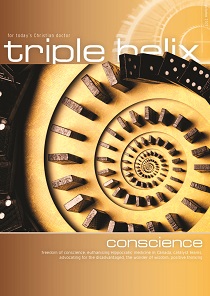The need for wisdom
In the early 1990s, I was just starting as a trainee psychiatrist. The woman booked to see me was one of the first patients with depression for whom I was responsible. I had about 20 minutes to evaluate how she was doing, review her diagnosis, and decide treatment options. But this particular lady did not seem to be getting any better despite all the different medications she was taking. I went through her history, feeling something was not quite right. I must have been about the fourth or fifth junior doctor she had seen in the previous two years.
One of the things we are taught in medical school is that when you feel stuck, go back and review the diagnosis for anything that might have been missed. I found myself saying to her, 'Is there something we are unaware of or missing?' This was an invitation to drop the bombshell.
'I have been having a prolonged affair with a neighbour who lives across the road. His wife does not know. In fact, she's my best friend. She's the friend who brought me to the clinic today. She's sitting outside the room right now!' I was one of the first people she had told.
Her unresolved depression now made complete sense - she was living in guilt and out of congruency with herself. As sensitively as I could, I attempted to explain that no medication in the world could satisfactorily help her. To make progress, she would have to go through the difficult and painful task of facing up to what had happened. From there, she would have to deal with the uncertain consequences of the decisions she had made. She did not need additional or different medications or therapies.
We could waste a lot of time going down those mistaken paths. But now she had a choice to make; to turn back from the direction she had taken. As a psychiatrist, I could have kept on the path of adjusting the dose and type of her antidepressants. But I am convinced that she needed wisdom. Her experience and understanding of how life functions had hit a dead end. The only way out was to take a different turning and seek to live in wisdom with the choices she had made.
The hunger for wisdom
Human beings are innately curious about our world. It goes back to the first man and woman in the Garden of Eden in Genesis.
After the creation of the heavens and earth (which in Proverbs 8 is by the Person of Wisdom), Scripture tells us about the creation of a garden and the arrival of the first man. [1]
The man is told he can eat anything in the garden except fruit from the tree of the knowledge of good and evil, which will lead to certain death. [2]
God then states that it is not good for the man to be alone and that he will make a suitable helper for him. Following the creation of the animals and birds, we read of the creation of the woman. At this point, the serpent arrives, described as 'more crafty than any of the wild animals the Lord God had made'. (Genesis 3:1)
The word 'crafty' used to describe the serpent is related to the word for wisdom but describes indirect and deceitful ways to achieve one's aims. The serpent asks the woman about what God had said. The shrewd use of the question begins to lay doubt in her mind about the good intentions of God. It also serves to take attention away from all God has provided onto the one thing he has prohibited.
The woman's reply to the snake is even stricter than what God had said to the man, adding that they must not even touch the tree. [3]
Now the serpent craftily focuses on what is prohibited and inserts the blatant lie that they will not certainly die, but 'your eyes will be opened, and you will be like God, knowing good and evil'. (Genesis 3:5) The serpent causes the woman to doubt what God has said and listens to him rather than God. We are intriguingly told the fruit was 'desirable for gaining wisdom'. (Genesis 3:6)
The consequences of the deceit of the serpent have been unleashed. The rest of Scripture, it can be argued, is about reversing that terrible decision and learning to desire wisdom on God's terms and not the lie of the serpent.
The promise of wisdom
The concept of wisdom is rich and deep in both life and the Scriptures. The Person of Wisdom described in the Old Testament is the means by which God creates the universe in all its beauty and greatness. On a more personal level, it is also how we learn to live life well in all its complexity and confusion. The three Old Testament books of Proverbs, Ecclesiastes, and Job examine wisdom through different, complementary voices.
Proverbs presents wisdom as a brilliant teacher, Lady Wisdom, who is smart and full of insight about a wide range of life's issues relating to work, relationships, sex, and spirituality. In Proverbs 3:18 she is described as 'a tree of life to those who embrace her', bringing an echo of what was lost when the man and woman were expelled from the garden.
However, as we get older and experience life, we discover many contradictions, confusions, and challenges. This is the theme of Ecclesiastes. The writer is personified as a sharp, middle-aged, somewhat cynical critic who challenges the thinking that using wisdom will simply bring you success. He is disturbed by the relentless progression of time, meaning people and things that are important today are quickly forgotten for new people and things tomorrow.
Then there is the mystery of death, leading to a sense of pointlessness, as we are all ultimately going to die. And finally, from a 'this-world-perspective' life 'under the sun' all appears so random, making Proverbs' simple solutions unsatisfactory and almost a cruel joke.
After a long journey to find meaning in education, employment, enjoyment, and enrichment, the writer concludes the only thing that really matters is a life that remembers we will have to account to God for all our seen and unseen choices and decisions. [4]
So, while there is a God who knows and sees everything, there is still much that is mysterious about life. Why is there so much suffering, cruelty, and unfairness? That leads to the third voice of wisdom from the book of Job.
He is the seasoned old man who has experienced the good, bad, and ugly of life in extreme measures. He is also, unwittingly, the one who is brought into a cosmic test involving the serpent in the form of Satan.
The big question of the book of Job is 'Does Job fear God for nothing?' (Job 1:8) That is the question Satan cynically puts to God when they discuss Job's devotion and reverence for God. Job, through his fear of the Lord, is living in wisdom. But is he doing so only because he knows that is the best way to live a good life? It's the question all of us have to grapple with in our own pilgrimage with the Lord. Do I obey God for what I can get out of him, or because I truly love him?
At the end of all his suffering, Job is brought face to face with the awe and wonder of God, who concludes by showing Job two wondrous beasts (chapters 40 and 41), proclaiming how great they are. God admits they are dangerous with the power to kill. His big surprise is to say they are not evil because they are a part of his good world. And that is all God says to defend himself. The response to the mystery of life is awe, wonder, and worship.
The quest for wisdom
A quest is a long search for something difficult to find or to achieve. It is different from an adventure, where you go out on an exciting journey. It spices up your life, and then you come back home to pick up where you left off. By contrast, a quest is not something you choose. The quest chooses you. You are called to it because of what is going to be demanded of you. In many ways, the person you are at the beginning never really comes back from a quest. Either you die on the quest, or if you do come back, you are so fundamentally changed that you are not the same person as when you set out.
The wonder of wisdom is in navigating all the chaos, complexity, confusion, cynicism, and mistrust of the world as disciples of Christ. We are called into a deeper and richer relationship with the embodiment of wisdom, the Lord Jesus Christ. He is our wisdom. He calls us to include him in all the uncertainty and confusion we find ourselves in.
Thus begins our own personal wonder of wisdom that will take us to the end of our lives and beyond. This is the biblical hope that is founded on the resurrection of Christ from the dead. Grasping the implications will truly transform everything. I believe it could also transform that patient's life, who I met all those years ago.
Sunil Raheja is a consultant psychiatrist, speaker, podcaster, and author
This article is based on a talk adapted from Sunil's book Dancing with Wisdom: A Sacred Quest to Restore Meaning, Purpose and Fun to Your Life and Work. You can download the first chapter at his website, drsunil.com
The complete talk this article is based on can be accessed at drsunil.com/wonder.
Read the CMF review of the book.
































